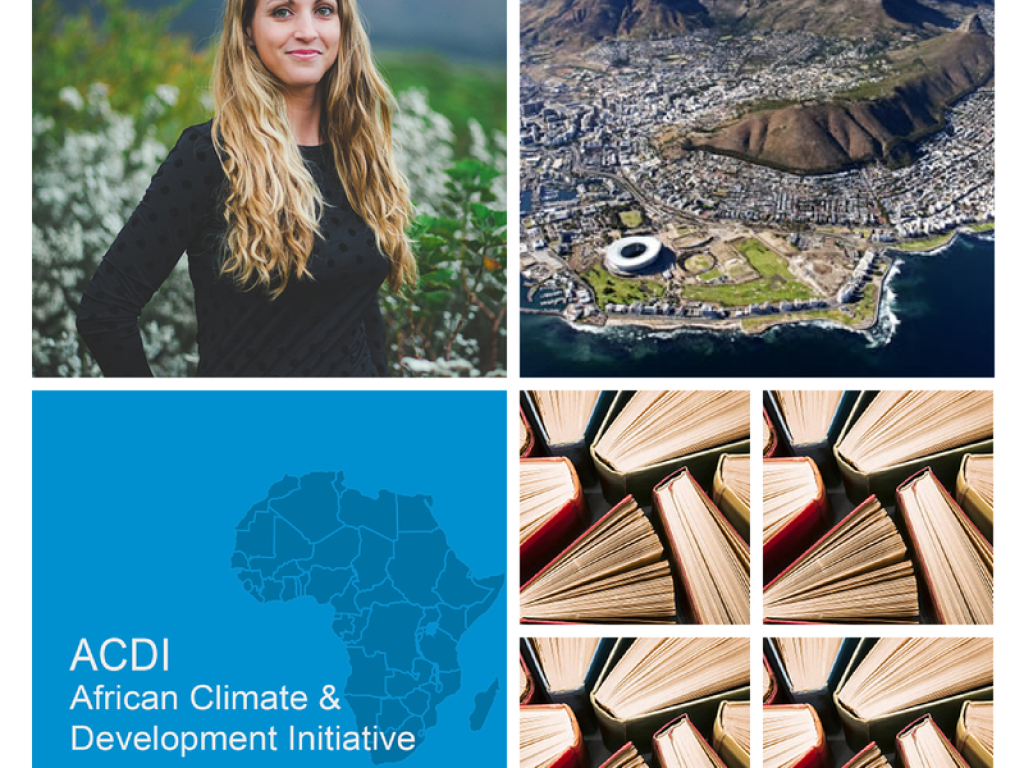A Personal Journey from the U.S to the ACDI Masters Program

By Monica Giermek
In my search for a master’s program to prepare me for a career in urban hydrology, the ACDI MSc/MPhil program stuck out immediately. While situated at the globally recognized University of Cape Town, I saw many reasons why this was the ideal program for me. Aside from being located in the most beautiful city I have ever lived in (I was not born here – so I’m not as biased as some Capetonians may be), the concentration of climate research and consulting firms within the city was also a selling point for me as I relocated from the United States. After having lived in Cape Town for three years now and beginning the ACDI MSc program in February this year, my only regret is that I did not apply sooner.
My passion is urban hydrology, and initially I questioned if this program of ‘Climate Change and Sustainable Development’ would allow me focus on my specific interest. The program is course based (four in total) with a minor dissertation (research resulting in a 25,000 word thesis). There are two mandatory core courses as well as two electives. The first core course focuses on climate change and sustainable development, with the second focusing on climate change mitigation and adaptation. Combined, these two provided me with a sturdy foundation of climate knowledge. The remaining two courses are electives, which (with approval from the course convener) I was able to select from any faculty on the UCT campus: law, business, economics, engineering, arts, humanities, etc. The diversity of potential electives to choose from is incredible, which I greatly appreciated. I recall flipping through the thick course book in February, struggling to narrow down my top picks down to only two! I felt inspired and energized just reading the course descriptions that were available to me. In the end, I choose a water resource management course, along with a course focusing on sustainable urban systems. Combined, these two perfectly complimented the climate change courses and matched my urban hydrology passion. Fellow classmates have specialized in topics ranging from food security, paleontology and consumer purchasing habits – all finding well matched electives for their diverse research interests.
As an American, I initially questioned if this program would prepare me for global career opportunities. Recent studies have confirmed that Africa is among the most vulnerable continents to climate variability and change, due to multiple stresses and low adaptive capacity*. Personally, I could not think of where better to study climate change than at the top university on the African continent**, where leading scientists are closely examining global climate changes. Irrespective of which sector I plan to integrate into post-graduation (private consulting, academic research, government), climate change will no doubt play a factor. While naturally many topics within class focus on south and southern Africa, climate change is a worldwide issue and therefore is frequently discussed on a global basis. Our 2014 class ascend from 6 different countries (meet my lovely classmates here), adding to the richness of class discussions and debates. I feel that ACDI’s rigorous coursework paired with outstanding academics has prepared me for employment here in Cape Town, should I wish to stay in this picturesque city, as well as for employment opportunities in my home country and abroad.
An additional concern of mine was being a “mature” student on campus. Having been out of university for years, I was nervous about coping with exams and assignments. Let me not lie here and say this past semester was easy. The past six months I have been up late more nights than I can count, politely declined almost every dinner party I was invited to, and the file drawers at the office slowly became fully stocked cupboards (and by fully stocked, I mean instant coffee and 2 minute noodles) as myself and classmates gradually began spending every waking hour on campus. I worked harder than I have in years; however I did not feel at a disadvantage for having taken a six year break from studying. The majority of my classmates (actually, all but one) did not enter the program straight from an undergraduate degree, and our collective global work experience enriched the program beyond what the curriculum held. It was a rigorous first semester, but had it been easy, I would surely have questioned the quality of the program.
Six months in, I have no regrets for choosing to attain my MSc through ACDI. I feel that my course work, coupled with independent research, has prepared me well for my dream career path of working with local governments to adapt urban hydrology to create climate resilient cities. While I am still 5 months from completing the program, I regularly keep an eye on career openings. I have been pleasantly surprised how confident I feel that my skills acquired through ACDI are a great match to many position requirements, both in climate and hydrology sectors.
*Boko, M., I. Niang, A. Nyong, C. Vogel, A. Githeko, M. Medany, B. Osman-Elasha, R. Tabo and P. Yanda, 2007: Africa. Climate Change 2007: Impacts, Adaptation and Vulnerability. Contribution of Working Group II to the Fourth Assessment Report of the Intergovernmental Panel on Climate Change, M.L. Parry, O.F. Canziani, J.P. Palutikof, P.J. van der Linden and C.E. Hanson, Eds., Cambridge University Press, Cambridge UK, 433-467.
**University Ranking by Academic Performance, (2014). URAP - University Ranking by Academic Performance. [online] Urapcenter.org. Available at: http://www.urapcenter.org/2013/region.php?rcode=AF [Accessed 18 Aug. 2014].
Learn more about the program here, as well as view scholarship opportunities here.